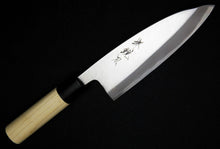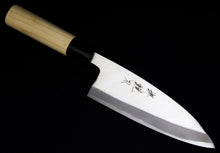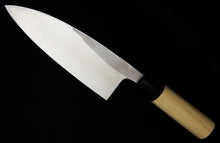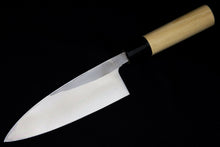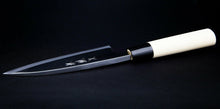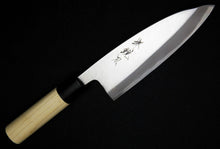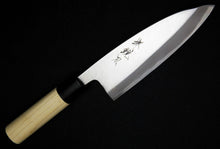
Deba Japanese pointed carving knives are Japanese style kitchen knives primarily used to cut fish, though also used when cutting meat.
The deba first appeared during the Edo period in Sakai.
It is designed to behead and fillet fish.
Its thickness, and often a more obtuse angle on the back of the heel allow it to cut off the heads of fish without damage.
The rest of the blade is then used to ride against the fish bones, separating the fillet.
Traditionally, these are made of carbon steel, which needs regular maintenance and oiling to prevent rust.
The carbon steel blades can be honed into a sharper cutting edge.
However, the deba is not intended for chopping large diameter bones.
Condition: Brand New
Brand: Sakai Ajin
Blade material: Yasuki Hagane Steel
Region of Manufacture: Japan
Product Details: Deba knife
Blade length: 150mm
Handle material: Magnolia wood
Specification: For Right Handed Customer
Please choose it among the following various type.
1. Only Deba knife
2. Deba knife + Scabbard/ Magnolia wood
*Attention Customer: The price is charged per each 1 item.
Sakai knives are carefully made one by one.
They have received good reviews from many professional chefs and now it's said most of the knives they use are from Sakai.
Similar to Japanese swords, Sakai cutlery is also produced through a process of forging.
The features of Sakai cutlery are rooted in superior metalworking and sharpening techniques.
This is a traditional characteristic of Sakai cutlery, recognition of which has resulted in designation as a traditional craft product by the Japanese Minister of Economy, Trade and Industry.
Sakai knives manufacturing process is divided into 3 stages; forging, grinding, and attaching the handle.
It's a division of work in which each craftsman creates using special skills.
In the forging process, the hardness as well as the stickiness of steel are improved in order to make the knife sharp and difficult to chip. There are technical processes such as Hagane-zuke (forging 2 kinds of steel - soft steel and steel), Yaki-Namashi (slowly annealing hot knife-shaped steel), Yaki-ire (immediately chilling steel in the water right after heating it to 780 - 800 degrees), and Yaki-Modoshi (heating steel to 160 - 180 degrees again in the furnace).
In this way, the process of making each product requires very difficult and professional techniques which only experienced craftsmen can perform.
Use & Care
Apply mild detergent on a soft sponge or wet cloth to clean. Do not use bleach. Do not use dishwasher.
Use a clean dry cloth to wipe and dry it immediately after every use.
Use sharpening stones to sharpen Japanese knives do not use a sharpening steel.
For less frequently used knives apply oil very thinly after the knives are sharpened cleaned and dried.
Do not cut frozen foods.
Shipping type:International Postal Service or FedEx or DHL
Attention Customer,
--- If your package arrives damaged ---
1. If the package which damaged during delivery are delivered to you because the regular sales products inspected finally in Japan are shipped by all means, please consult with me at first.
2. Futhermore, if the item was broken and delivered, please keep the package and declare the loss or damage to the shipping carrier.
3. Please immediately present the article, the container, wrapping, packaging, and any other contents received in damaged condition to the shipping carrier for inspection, and please fill out a damage report.
Import duties, taxes and charges are not included in the item price or shipping charges. These charges are the buyer's responsibility.
Please check with your country's customs office to determine what these additional costs will be prior to bidding/buying.
These charges are normally collected by the delivering freight (shipping) company or when you pick the item up - do not confuse them for additional shipping charges.
We do not mark merchandise values below value or mark items as "gifts" -US and International government regulations prohibit such behavior.
The price is charged per each 1 item.







